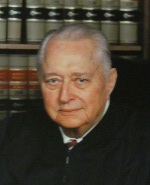
Mitchell received a B.A. from Louisiana State University in 1934 and an LL.B. from Louisiana State University Law School in 1937. After practicing law in Pontchatoula, Louisiana, for one year, he joined the Federal Bureau of Investigation as a special agent, where he served from 1938 to 1941. He worked as an attorney for the United States Securities and Exchange Commission from 1941 to 1942.
A member of the Army Reserves since 1935, he was called to active duty in 1942 and served the remainder of WWII in the Judge Advocates General Corps, attaining the rank of Lieutenant Colonel. After leaving the regular army in 1946, Mitchell continued to serve in the United States Army Reserves and was promoted to full colonel.
In 1946, Mitchell became an assistant United States Attorney in the Eastern District of Louisiana. He remained in that position until 1953. He then became a partner in the New Orleans law firm of Deutsch, Kerrigan and Stiles, where he practiced from 1953 until 1966, when he became a federal judge.
Lansing Mitchell was a colorful character who was known as "Tut" to his family and his many friends. This name suited him perfectly because he was always holding court no matter where he was.
Judge Mitchell will be remembered for his phrases. His favorite was that there were two great things President Lyndon Johnson did - sign the Rio Grande treaty and appointing Mitchell to a judgeship. "Thank you, Lyndon, and God Bless you where ever you are" was heard by many of Mitchell's friends over the years.
Judge Mitchell was known for favoring the underdog and did not let his robe defuse his annoyance when he thought one was being treated unfairly. Theo Duronselet, Judge Mitchell's long-time bailiff, noted that, Judge Mithchell "was well ahead of the times on racial fairness. He was equally fair to all parties in his court, and outside the confines of his courtroom, insisted that all [people] receive appropriate respect."
In Redman v. Terrebonne Parish School Board, 293 F. Supp. 376 (E.D.La. 1967), a school desegregation case, he ordered the elimination of discrimination commencing with the 1967-1968 school year in the areas of choice of schools, student transfers, school services, facilities, activities and programs, and faculty employment.
In the 1970s when the government was prosecuting marijuana cases, Judge Mitchell threw out a criminal case against a young Vietnam veteran who was charged with receiving drugs shipped through the mail because the FBI arrested him in the middle of his wedding. He was furious, and told the United States Attorney he would not stand for it, stating "they could have at least waited until the wedding was over."
In 2001, when Lansing Mitchell died, Times Picayune reporter Susan Finch wrote in his obituary about an instance in 1975 when Judge Mitchell questioned prospective jurors in a federal gambling case. He asked whether any of the jurors had ever placed a bet with a bookie. None of them responded. Mitchell assured them they would not be prosecuted for having placed an illegal bet and still no hands were raised. Then one hand went up. It was Judge Mitchell's.
